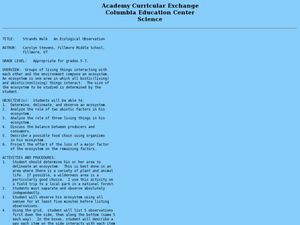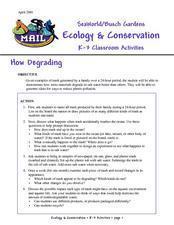Curated OER
Fruits and Vegetables in the Food System
Young scholars examine the importance of local markets. In this horticulture lesson, students examine the importance of local markets and food systems that can provide profit for growers, freshness, variety and quality.
Curated OER
No Impact Project: Water
Students use the "No Impact Project" to analyze the consumption of water. In this water consumption lesson, students discuss the pros and cons of tap water or bottled water. Students read about chemicals in water and watch a video clip...
Curated OER
Tree Inventory and Map Project
In this tree inventory and map project worksheet, students follow the directions on how to take inventories of trees and create a map from it. Students follow 4 sets of directions.
Curated OER
Quality of Life Investigations: Risk Reductions
Young scholars participate in a discussion of recent environmental issues affecting their own community or ones nearby. In groups, they research the role of food additives and the purpose of adding them to foods. They also determine...
Curated OER
Testing for Vitamin C in Different Drinks and Foods
Students examine the importance of vitamin c in their diets and the sources that it comes from. In this vitamin lesson students complete hands on activities, interpret data and make a bar graph.
Curated OER
Owl Pellets
Sixth graders investigate the role of owls in their ecosystem. In this food chain lesson, 6th graders illustrate an owl food chain, dissect an owl pellet, and analyze data. Students discuss what would happen to owls if there were an...
Curated OER
Picture Perfect Pyramid
Young scholars investigate the concept of the food pyramid. The lesson includes background information for the teacher to lecture students about the food pyramid. They construct a model of the pyramid using cereal boxes. The projects...
Curated OER
4-H Companion Animal Project
In this 4-H animal science learning exercise, students will complete several activities about companion animals. Students will learn about feline feelings, dog breeds and their different groups, rabbit vocabulary and ideas for service...
Curated OER
Meet One Picky Bird
Students complete a research project In this endangered species lesson, students use the "Think, Puzzle, Explore" method to learn about endangered species. Students research and write a report on the red-cockaded woodpecker.
Curated OER
Strands Walk-An Ecological Obseravtion
In this ecosystem worksheet, students investigate an ecosystem at a local park or national forest, they make observations for five minutes, they complete a grid of their observations and they construct a hypothetical food chain. Students...
Curated OER
Science Videos
Students plan, practice, and act in a 2-3 minute videotaped production about a specific topic. Students from a local high school give presentations pertaining to seasons, earth rotation, and moon phases. Students analyze the...
Curated OER
A Bug's Life
In this biology activity, students create a presentation for a museum about the children they encounter during their journey as an insect. They identify the types of food the insect eats and its habitat. Students also describe their...
Curated OER
Science Lesson: Chocolate Flavored Cherries
Young scholars are able to identify start and stop sequences in DNA. They are able to model using restriction enzyme and ligase to remove sections of DNA and reattach them. Students are introduced to the process of recombinat DNA...
Curated OER
Fresh Produce North of 60
Teen-agers discuss how fresh produce is brought into areas that do not have agreeable growing conditions and read an article from Canadian Agriculture at a Glance. They write an essay about projects that may help provide food in these...
Curated OER
The Food Pyramid
Third graders investigate the concept of The Food Pyramid and its importance as a foundation for good health. They use the computer lab as a class to construct projects using the Kidpix software to make their own imitations of The Food...
Out-of-School Time Resource Center
Nutrition and Physical Activity
Emerging nutritionists explore what it means to be healthy. In the beginning of the unit, your class will examine the five food groups and learn how food gets from the farm to our plates. This leads into the investigation of the...
Early Childhood Learning and Knowlege Center
My Body My Senses
In a comprehensive unit of activities, learners explore the five senses. Youngsters discover the many different body parts and their functions that allow humans to have sense of sight, touch, smell, taste, and hearing. The best way to...
Channel Islands Film
Natural Resources, and Human Uses of Plants and Animals
As part of their study of the restoration projects on Santa Cruz Island, class members demonstrate their understanding of the connections among plant life, animals, and the actions of humans by crafting a model that reveals these...
Curated OER
Beat a Leaf
A simple, yet effective classroom activity is described in this resource on leaves and how they grow. The activity should lead pupils to discover how plants make their own food and what they need to survive. In the activity, they create...
Curated OER
Potatoes and Potato Stamps
Here is an informative and engaging instructional activity potatoes for your young farmers! In it, learners discover how potatoes are grown, where they come from, and they list foods made from potatoes. They do a really fun art project...
SeaWorld
Ecology & Conservation
How much trash does an average family produce in 24 hours? Where does that trash end up? Get your youngsters thinking about ecology and conservation as they discuss the impact pollution has on the marine environment. After a deep...
Curated OER
Science: Lead Shot and Waterfowl
Students examine data to investigate the impact of lead shot pellets on waterfowl populations. They graph their findings and discover how lead in ingested by birds and poisons them. As an extension, students research legislation and...
Curated OER
Testing for Life’s Molecules
Want to hear a joke about sodium? Na. Young scientists test various materials to identify if they include protein, starch, and glucose by using the Biuret test, iodine starch test, and Benedict's test respectively. After practicing with...
Captain Planet Foundation
Rotting Away
What happens at the end of a plant's life cycle? Show kids the natural way that plants show that they're decomposing, as well as the importance of compost, with a lesson about living organisms. After reading Log Cabin by Anne Schreiber,...
Other popular searches
- Science Project Food Apples
- Science Project Food Chain
- Science Project Food Waste
- Science Project Food Rice
- Food Science Fair Projects
- Science Project Food Decay
- Science Projects Food Chain

























